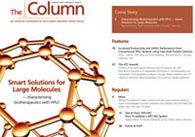Characterizing Biotherapeutics with HPLC — Smart Solutions for Large Molecules
This article features some of the most frequently used HPLC applications for the characterization of biopharmaceuticals.
Development and production of biopharmaceuticals is a growing segment of pharmaceutical industry. Therapeutic proteins include blood factors, thrombolytic agents, growth factors, interferons, interleukins, therapeutic enzymes and last but not least monoclonal antibodies. More than twenty monoclonal antibody (MAb) therapeutics have been approved for the treatment of a broad range of diseases including autoimmune, cardiovascular, infectious diseases and cancer. A thorough characterization of therapeutic biomolecules is a key task for the successful submission of research and production data for regulatory approvals of new drugs. Due to its high degree of automation, robustness and reproducibility liquid chromatography is the workhorse of the pharmaceutical laboratory. Therefore, HPLC is also frequently used when establishing analysis methods for biotherapeutics. This article features some of the most frequently used HPLC applications for the characterization of biopharmaceuticals.
Characterizing Polyamides Using Reversed-Phase Liquid Chromatography
May 5th 2025Polyamides can be difficult to characterize, despite their use in various aspects of everyday life. Vrije Universiteit Amsterdam researchers hoped to address this using a reversed-phase liquid chromatography (RPLC)-based approach.
New Method Explored for the Detection of CECs in Crops Irrigated with Contaminated Water
April 30th 2025This new study presents a validated QuEChERS–LC-MS/MS method for detecting eight persistent, mobile, and toxic substances in escarole, tomatoes, and tomato leaves irrigated with contaminated water.
University of Tasmania Researchers Explore Haloacetic Acid Determiniation in Water with capLC–MS
April 29th 2025Haloacetic acid detection has become important when analyzing drinking and swimming pool water. University of Tasmania researchers have begun applying capillary liquid chromatography as a means of detecting these substances.

.png&w=3840&q=75)

.png&w=3840&q=75)



.png&w=3840&q=75)



.png&w=3840&q=75)










